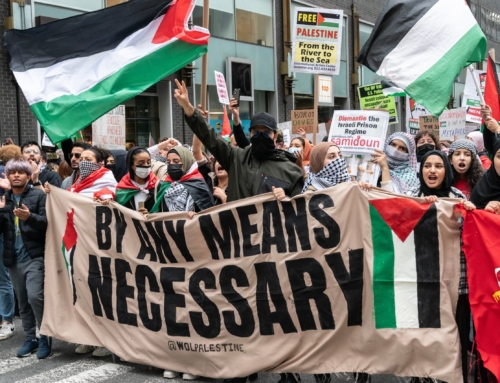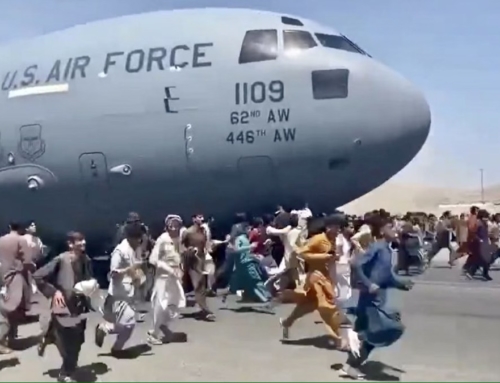The New York Times has a “Bombshell” report out with the headline At Least 37 Million People Have Been Displaced by America’s War on Terror. The story was followed by multiple other outlets with headlines stating the same thing: 37 million refugees since 9/11 are a direct result of United States’ military operations. The articles are based on an analysis conducted by Brown University resulting in a report titled: Creating Refugees: Displacement Caused by the United States’ Post-9/11 Wars.
The reporting is designed to inculcate in the reader that the exorbitant number of refugees since 9/11 are the sole result of United States military action. The report includes a graph of wartime refugees since 9/11 with the title: Millions displaced by U.S. post 9/11 wars, and one line in NY Times article states, “…yet, the report says it is the first time the number of people displaced by U.S. military involvement during this period has been calculated.” Read that closely. The number of people displaced by U.S. military involvement.
While I completely agree that conflict displacement is a tragedy that requires robust attention, saying the U.S. is the source of it is a causal fallacy. It’s like saying, “Every time I see a car accident, there’s an ambulance. Ambulances must cause car accidents.” The problem with all of this inuendo is that the report is based on eight conflict countries where the United States has had military involvement, regardless of how small, and yet goes on to lay the refugee crisis solely at the feet of the United States. This is irresponsible on the part of the researchers and shoddy journalism from the New York Times. The question shouldn’t be “Were there any refugees in a country within which the United States has a military presence?”, but the opposite: “Would there have been refugees had the United States not had a presence at all?” Or better yet, “Did the U.S. presence lesson the number of refugees?” But that would belie the point. The NY Times isn’t looking to shine a light on displacement of civilians during conflict. It’s looking to paint the United States as the bad guy.
The eight countries in the study are Afghanistan, Iraq, Pakistan, Yemen, Somalia, the Philippines, Syria and Libya – conflict countries that the United States has had an involvement, and thus, apparently, gleaning sole responsibility for the resulting refugees. I read the list of nations, and, given my knowledge of U.S. involvement, my immediate thought was, “This title is completely misleading”.
For instance, why is Syria on this list? How on earth are we responsible for the Syrian refugee crisis? Bashar al Assad used barrel bombs and chemical weapons on his own population. Turkey invaded the Kurdish areas, killing wholesale. Russia has propped up Assad relentlessly using its own aircraft for strikes against civilian populations, and ISIS went ripping through the country tearing it apart – all before we planted one boot on the terrain – and yet it’s the fault of the U.S. that there are refugees? I have a memory long enough to remember Obama getting castigated for doing nothing in Syria as Assad slaughtered his own people. Remember the failed “red line” that was crossed? Remember the chemical weapons use? And so when the United States finally does step in as a response to the atrocities, we’re now responsible for the creation of all Syrian refugees?
And how are we responsible for the humanitarian disaster that is Yemen? The Houthis – a proxy force funded by Iran – took over the capital of Sanaa, causing a civil war. Because we conducted some drone strikes against Al Qaida in the Arabian Peninsula in Yemen, we’re now the cause of the entire refugee crisis that’s the direct result of a civil war? The study makes the tenuous link that since we are supporting Saudi Arabia with weaponry and logistics in its effort to prop up the government against the Houthis, we’re responsible for those refugees as well. The truth of the matter is that our help is stemming the collateral damage. KSA was flinging bombs all over the place, causing horrific damage to civilian populations, and it was the United States that said, “If you want our help, you need to stop the collateral damage”. The result? It decreased. And yet according to the inferences in the report and the NYT piece, every single refugee from the greatest humanitarian disaster since World War II is the fault of a U.S. “9/11 War”.
And the Philippines? It has an insurgency on the island of Mindanao from a group of Islamic radicals who swore fealty first to Al Qaeda, and then ISIS. That is what is causing the refugees fleeing the area – internal conflict. The United States was asked to help to quell the violence – in effect, help stop the creation of refugees – and yet, since we were involved, it’s our fault there are refugees. In truth, had we stayed out completely, the refugee flow would have been much worse. Of course, if that were the case, it wouldn’t have counted as a “9/11 U.S. War”, and thus wouldn’t have made the list. It doesn’t appear that actual refugee numbers are the purpose here so much as placing blame on the United States.
On to Libya, yet another crisis which had nothing to do with a “9/11 War on Terror”. In fact, it had nothing to do with terrorism. It was a civil war rising out of the Arab Spring because Qaddafi was a despot. Yes, we did join a NATO alliance to secure a no-fly zone to protect the civilian population from being slaughtered, and that ultimately caused the downfall of Qaddafi, but so did France, the United Kingdom, and other NATO allies. Had we stayed out completely, there might very well have been a smaller refugee problem out of Libya – but only because all of them would be dead.
Reporting on the causation of conflict refugees is a worthy endeavor, and make no mistake, two countries on the list are most definitely the byproduct of US involvement. One is Iraq. The refugees there are truly a direct result of United States actions, and the fallout from that endeavor will be felt for generations. There is no sugar coating that fact. Afghanistan is the other, but it was a US reaction to the attacks on U.S. soil after 9/11, something conveniently forgotten in the analysis – as if the United States went into Afghanistan for some imperialist reason, instead of it being the result of all the NYC “refugees” and dead created by the terrorism of 9/11.
Stating that the United States is responsible for the creation of refugees all over the world since 9/11 simply because we had a presence in a conflict country is disingenuous and destroys the credibility of both the report and the intentions of its authors (and I’m being charitable here, because I fully believe that disparaging the United States military was the intention, cloaked in a refugee story). I suppose if they had written a report following World War II it would have been titled, “Creating Refugees: Displacement by the United States invasion of Europe and Japan”, conveniently forgetting Hitler, Tojo, and the AXIS powers.
I know it’s hard for professors at Brown and journalists at the NY Times to fathom, but sometimes the United States military helps prevent displaced persons in wartime. The article and study are focused on post-9/11, but if they were to expand it, would they blame the United States for trying to separate the warring factions in Somalia in 1993 in order to prevent a famine, leading to the death of 18 Americans in Blackhawk Down? The turmoil continuing in Somalia today is a direct descendant of that civil unrest. Why is the current fight – according to the report – a direct reflection of the United States creating refugees, when the genesis of that conflict is decades old and the first introduction of U.S. forces in the country was done trying to prevent the creation of refugees? Going further, would they castigate the United States for the flow of Bosnian refugees because we stopped the killing that was occurring there? Now that I think about it, thank heavens we stayed out of the Rwandan Genocide and let those people get slaughtered, because if we’d stepped in, the NY Times would have then blamed the U.S. military for the creation of the refugees that were left alive.
In the end, the United States is not perfect, and we should be cognizant of the second- and third-order effects of any engagement, be it military or otherwise. Simply tallying up total numbers and using that total in a salacious headline to smear the United States and its military does nothing for refugees – as I’m sure the New York Times and Brown University are fully aware.









Well stated facts, thanks for providing the correction which will never be seen in the NYT.
Thank you Brad for correcting the anti-American Military NY Times. This is the kind of History that is being taught in our schools and universities. Now we’re seeing the results in many of our young people. Damn shame.
Thank you for this excellent analysis. The NYT has no credibility anymore, and their article just confirms it.
Singling our single source blame for catastrophe in this complex and tangled world is usually based on prejudice and
often outright antipathy. These seem to be prevalent in mass media and in factions and insurgents who have the demise of democracy as their ultimate aim. Two of my favorite authors, in one place, shedding light on this unfortunate reality, is as “spot on” as it can get!
The short answer is the McGovernite lefty press has to insulate the Skippy Obama legacy from any detagatory and factual content: Eight plus years of bent lib fluffing of clueless international neglect takes some solid tree-killing work, by those very empty pens that have never set an objective foot on West Point or Quantico or Norfolk. Even worse is Uncle Joe Biden has now re-assembled most of the same crew of easy appeasing suits and pumps, Ben Rhodes and John Kerry at the extra leaky Blame America First helm, should the City Sham of 2020 make it through our still too wobbly SCOTUS. #CrimeaWho #OneBigBBC #Fraudapalooza #StayTuned
Apparently the idea is that without the existence of the USA, the Middle East would be a land of honey and friendship between all peoples ignoring all history since 50AD or so. I refuse to uses the CE Z(common era ) notation.
should have been 500AD not 50AD